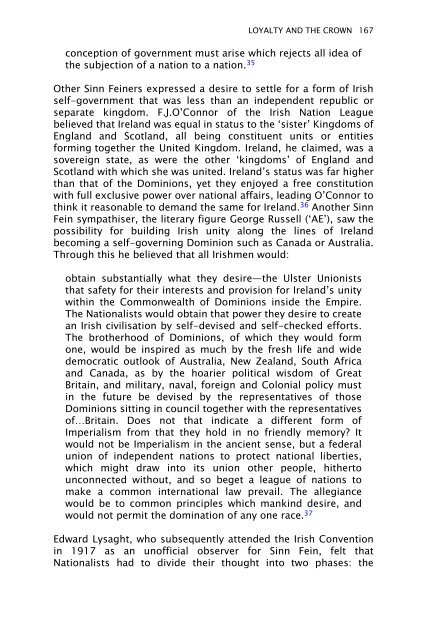Dividing Ireland: World War I and Partition
Dividing Ireland: World War I and Partition
Dividing Ireland: World War I and Partition
Create successful ePaper yourself
Turn your PDF publications into a flip-book with our unique Google optimized e-Paper software.
LOYALTY AND THE CROWN 167<br />
conception of government must arise which rejects all idea of<br />
the subjection of a nation to a nation. 35<br />
Other Sinn Feiners expressed a desire to settle for a form of Irish<br />
self-government that was less than an independent republic or<br />
separate kingdom. F.J.O’Connor of the Irish Nation League<br />
believed that <strong>Irel<strong>and</strong></strong> was equal in status to the ‘sister’ Kingdoms of<br />
Engl<strong>and</strong> <strong>and</strong> Scotl<strong>and</strong>, all being constituent units or entities<br />
forming together the United Kingdom. <strong>Irel<strong>and</strong></strong>, he claimed, was a<br />
sovereign state, as were the other ‘kingdoms’ of Engl<strong>and</strong> <strong>and</strong><br />
Scotl<strong>and</strong> with which she was united. <strong>Irel<strong>and</strong></strong>’s status was far higher<br />
than that of the Dominions, yet they enjoyed a free constitution<br />
with full exclusive power over national affairs, leading O’Connor to<br />
think it reasonable to dem<strong>and</strong> the same for <strong>Irel<strong>and</strong></strong>. 36 Another Sinn<br />
Fein sympathiser, the literary figure George Russell (‘AE’), saw the<br />
possibility for building Irish unity along the lines of <strong>Irel<strong>and</strong></strong><br />
becoming a self-governing Dominion such as Canada or Australia.<br />
Through this he believed that all Irishmen would:<br />
obtain substantially what they desire—the Ulster Unionists<br />
that safety for their interests <strong>and</strong> provision for <strong>Irel<strong>and</strong></strong>’s unity<br />
within the Commonwealth of Dominions inside the Empire.<br />
The Nationalists would obtain that power they desire to create<br />
an Irish civilisation by self-devised <strong>and</strong> self-checked efforts.<br />
The brotherhood of Dominions, of which they would form<br />
one, would be inspired as much by the fresh life <strong>and</strong> wide<br />
democratic outlook of Australia, New Zeal<strong>and</strong>, South Africa<br />
<strong>and</strong> Canada, as by the hoarier political wisdom of Great<br />
Britain, <strong>and</strong> military, naval, foreign <strong>and</strong> Colonial policy must<br />
in the future be devised by the representatives of those<br />
Dominions sitting in council together with the representatives<br />
of…Britain. Does not that indicate a different form of<br />
Imperialism from that they hold in no friendly memory? It<br />
would not be Imperialism in the ancient sense, but a federal<br />
union of independent nations to protect national liberties,<br />
which might draw into its union other people, hitherto<br />
unconnected without, <strong>and</strong> so beget a league of nations to<br />
make a common international law prevail. The allegiance<br />
would be to common principles which mankind desire, <strong>and</strong><br />
would not permit the domination of any one race. 37<br />
Edward Lysaght, who subsequently attended the Irish Convention<br />
in 1917 as an unofficial observer for Sinn Fein, felt that<br />
Nationalists had to divide their thought into two phases: the








